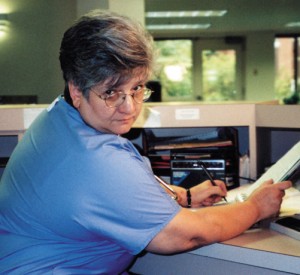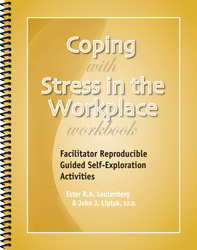Sources of Stress
People experience stress in the workplace in three primary ways. When these sources of stress are ignored, they can lead to accidents in the workplace, injuries, and even more stress. Stress from one of these sources can be difficult to overcome, but stress from more than one of these sources can be debilitating.
- Stress generated from within a person: Stress can be self-imposed through low self-esteem, anger, feelings of hopelessness, feelings of helplessness, anxiety, excessive negativity, the need to be in total control, perfectionistic tendencies, jealousy and hostility. For example, people who are perfectionistic often bring stress upon themselves by being too careful and worrying about tasks being perfect.
 Stress generated from the environment: Stress can be felt from the result of the work environment including overly demanding supervisors, low pay, poor working conditions, noisy work environments, too many commitments required for the work being done, long hours, lack of technology for employees to accomplish the work, lack of a safe place to work, whining co-workers, and complaining customers. Any of these external stressors can negatively affect the job performance of an employee. For example, a person who must work with an abrasive supervisor will feel uncomfortable most of the work day.
Stress generated from the environment: Stress can be felt from the result of the work environment including overly demanding supervisors, low pay, poor working conditions, noisy work environments, too many commitments required for the work being done, long hours, lack of technology for employees to accomplish the work, lack of a safe place to work, whining co-workers, and complaining customers. Any of these external stressors can negatively affect the job performance of an employee. For example, a person who must work with an abrasive supervisor will feel uncomfortable most of the work day.- Stress from a poor job fit: Sometimes stress is felt by employees who do not have a good fit between their interests and skills and the demands of their jobs. Many people find that a good job fit is critical in being productive and being able to cope with stress. For example, a person who is not satisfied working a repetitive job may find a lot less stress in a job that is creative and flexible.One of the reasons that many employees are unable to cope with the stress of the workplace is that they live by a set of outdated myths.
- The best employees work the longest hours. In fact, working smarter rather than harder is more productive.
- I need stress to meet deadlines. In fact, people who manage their time well and who are not pushed to deadlines are more productive and do a better job.
- You will not get ahead in the workplace if you are not worrying about your work 24/7. In fact, your capacity to do well occurs when you are stress-free, not stressed about work.
- The business is at fault. In fact, blaming the system does not help people to be less stressed and more productive. People who take responsibility for themselves and their work are the least stressed and more productive employees in any business.
 Above are just a few of the rationalizations that people tell themselves about work, stress, and productivity in the workplace. In order to deal with all of the various types of stress in the workplace, it will help to understand workplace stress and acquire tools and techniques for managing it. The Coping with Stress in the Workplace workbook provides assessments and self-guided activities to help participants learn useful skills for coping with the various forms of stress in the workplace.
Above are just a few of the rationalizations that people tell themselves about work, stress, and productivity in the workplace. In order to deal with all of the various types of stress in the workplace, it will help to understand workplace stress and acquire tools and techniques for managing it. The Coping with Stress in the Workplace workbook provides assessments and self-guided activities to help participants learn useful skills for coping with the various forms of stress in the workplace.
-From the Introduction of Coping with Stress in the Workplace, by Ester R.A. Leutenberg & John J. Liptak, Ed.D.
